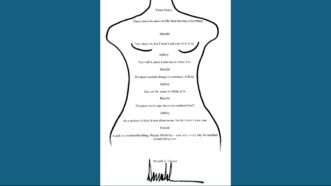Libel
IRS Agents Who Revealed Details About Hunter Biden Investigation Lose Libel Suit Against Biden's Lawyer
The lawyer's claims that plaintiffs had violated federal law were opinions based on disclosed facts, the court concludes.
Allegedly False Rape Accusations as Sexual Harassment for Title IX Purposes
"[P]ersistent and unfounded branding of a man as a 'rapist' cannot be easily dismissed as anything other than sex-based harassment."
From Prison to Helping the FBI to an Apple TV Miniseries … to Google-Hallucinated Libel?
Jimmy Keene, on whom the Apple TV miniseries Black Bird was based, sues Google alleging its AI hallucinated accusations that he's a convicted murderer serving a life sentence.
Judge Strikes Trump's Complaint in Libel Lawsuit Against N.Y. Times
"The complaint continues ... with much more, persistently alleged in abundant, florid, and enervating detail." "[A] complaint is not a public forum for vituperation and invective—not a protected platform to rage against an adversary. A complaint is not a megaphone for public relations or a podium for a passionate oration at a political rally or the functional equivalent of the Hyde Park Speakers' Corner."
Even If Trump's Birthday Letter to Jeffrey Epstein Is 'Fake,' How Is It Defamatory?
The president claims The Wall Street Journal inflicted "billions of dollars" in reputational damage by confirming a well-established relationship.
Alan Dershowitz's Libel Case Over CNN's Coverage of His Defense in Trump Impeachment Thrown Out
"For a public figure like Dershowitz to prevail, defamation law has long required proof of a speaker's actual malice: knowledge of or reckless disregard for the falsity of a statement. But here, the available evidence points to the reporters’ sincere—if mistaken or even overwrought—belief in the truth of their accusations."
Delaware S. Ct. Rejects Defamation Claim Brought by Repair Shop Owner Who Provided Hunter Biden Laptop to Media
It also rejects Hunter Biden's invasion-of-privacy counterclaim, on statute of limitations grounds.
Lawsuit by Hunter Biden's Lawyer Kevin Morris Against Conservative Activist Garrett Ziegler Can Go Forward
The remaining claims are for impersonation and portraying Morris in a false light by quoting out of context.
TRO Orders Removal of Allegations of DMCA Takedown Fraud and of Forged Court Order Submission—but …
... there had seemingly indeed been suspicious DMCA takedown requests targeting criticism of plaintiffs, though it's not clear whether they were submitted with the plaintiffs' approval.
TRO Against Alleged Defamation, and Also Banning "Harassing Conduct"
Plaintiff alleges Defendant engaged in "a coordinated online campaign making false statements," such as "accusing Plaintiff of design/invention theft, racism, ... and encouraging the public to report Plaintiff's online shopping platforms on sites like Etsy, Shopify, and TikTok as fraudulent and/or ... [as] selling counterfeit goods.'"
#TheyLied Lawsuits Alleging False Title IX Complaints: Defamation and Malicious Prosecution
"Malicious prosecution," which covers the bringing of civil and administrative quasi-judicial complaints and not just criminal complaints, becomes especially relevant given a recent Colorado Supreme Court decision limiting defamation claims.
Trump, Who Wants To 'Straighten Out the Press,' Sues The Wall Street Journal Over 'Fake' Epstein Letter
Whatever the merits of this particular defamation claim, the president has a long history of abusing the legal system to punish constitutionally protected speech.
#TheyLied Defamation Case Based on Allegations of False Accusations of Rape Can Go Forward
Anti-SLAPP motions generally can't be used to resolve he said/she said factual disputes in such matters.
Lawsuit Against Google for Accurately Reporting Negative Stories About Plaintiff Dismissed
Plaintiff claimed that the search results violated his "right of publicity," and also that the output was defamatory because it "uses a 'negative algorithm' that promotes negative stories about Garmon while suppressing positive stories about him—or, at least, pushing the positive stories down the list of search results."
Cancellation Litigation + Doxing Claim, over Allegedly Malicious Publicizing of Snapchat Video with Allegedly Racist Statements
"[B]oth parties exchanged these Snapchat videos while they were intoxicated and their judgment was impaired. Notwithstanding, the communications were private and intended to be jokes between close friends."
Defamation, Emotional Distress, Racism/Sexism Allegations, and Discovery
"[Defendant ex-employer's] request for all of [plaintiff's] communications containing language that is sexist or racist is overbroad."
Illinois Court Dismisses Defamation Suit Based on Allegations that Plaintiff Teacher Was "Anti-White" etc.
The court does, however, leave open the possibility that the plaintiff can file an amended complaint that can go forward.
Court Rejects Lawyer's and Client's Libel Claim Over Inside Higher Ed's Coverage of Title IX Suits
The court appears unmoved by the claim that an earlier ruling sent the "wrong message ... that people of color (all the plaintiffs are Latino) do not have a chance to get their day in this Honorable Court."



